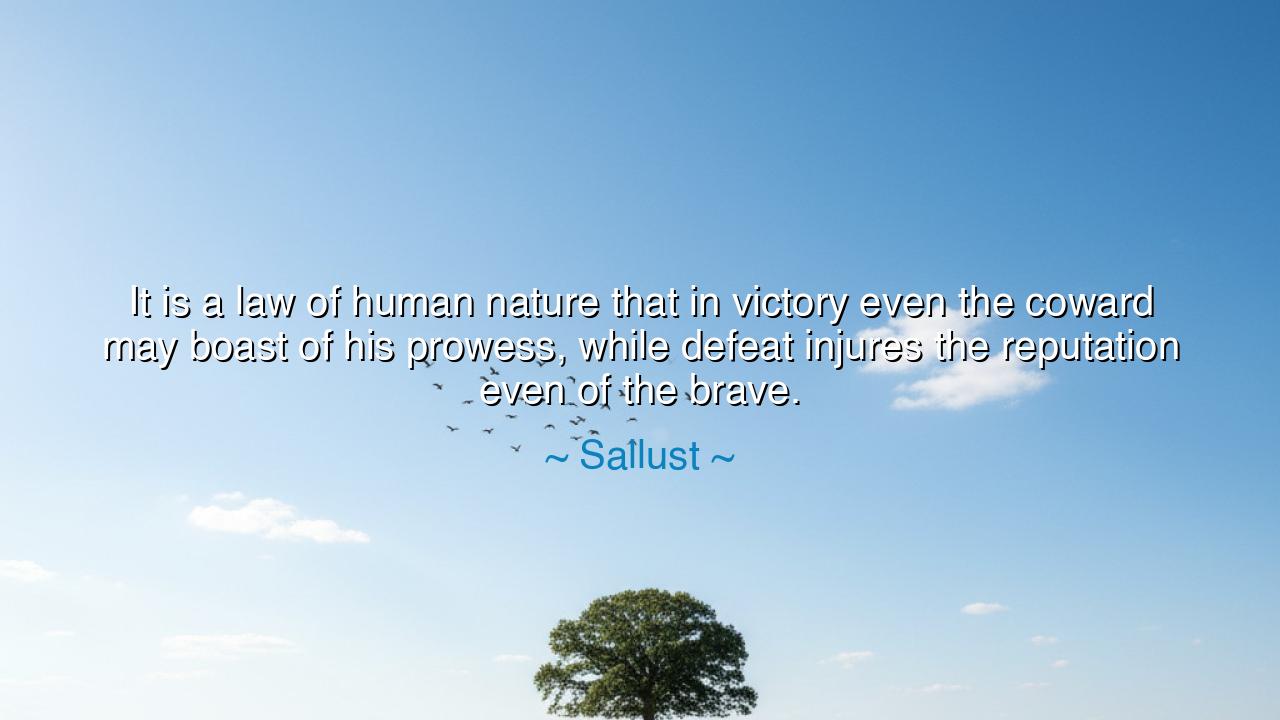
It is a law of human nature that in victory even the coward may
It is a law of human nature that in victory even the coward may boast of his prowess, while defeat injures the reputation even of the brave.






Hearken to the words of Sallust, the Roman historian, who knew well the shifting tides of fortune and the frailty of men: “It is a law of human nature that in victory even the coward may boast of his prowess, while defeat injures the reputation even of the brave.” This truth pierces to the heart of human vanity, for men judge not always by substance but by outcome, not by the purity of courage but by the glitter of triumph. Such is the fate of mortals—that glory and shame often depend not on virtue, but on the blind goddess Fortune.
For in victory, the crowd gathers like bees to honey. They praise without measure, they adorn the victor with laurels, and they forget his faults. Even the coward, who trembled in the hour of danger, may strut in triumph when his side prevails. His voice will swell with pride, though his heart quailed in the struggle. Men will not ask what part he played, but only whether he stood with the winning host. Thus, victory clothes even weakness in the garments of valor.
Yet behold the cruelty of defeat. When the banners fall and the dust of ruin rises, even the truly brave are covered in shame. Their courage is forgotten, their steadfastness overlooked. The multitude, fickle as the wind, will point and whisper: “They failed.” Thus does defeat injure reputation, though the soul of the warrior shone brighter than the morning star. Such is the injustice of human judgment—that men honor the end, not the spirit; the result, not the deed.
Think upon the tale of King Leonidas and his three hundred Spartans at Thermopylae. Their stand was the epitome of courage, yet in the immediate shadow of their defeat, many among Greece called it folly. Only in later years did their sacrifice shine as immortal glory. The law of human nature that Sallust speaks of was there revealed: at first, defeat obscured the radiance of their bravery; but in time, truth overcame the blindness of judgment. History, unlike the crowd, has a longer memory.
This law, then, is both warning and counsel. Warning, that you must not trust too deeply in the voices of men, for they praise the unworthy when Fortune smiles, and they condemn the worthy when she frowns. Counsel, that you must measure yourself not by victory or defeat, but by the steadfastness of your own soul. For only you and the gods know the truth of your courage. The applause of the crowd is fickle; the integrity of the heart endures.
But also see the lesson in humility. If victory comes to you, do not boast as if it proves your greatness. Even the coward boasts when he rides on Fortune’s chariot. Instead, give thanks, and remember that your triumph may say little of your character. And if defeat visits you, do not despair, for even the brave are shamed unjustly by it. Your worth is not diminished by Fortune’s turn, but rather proven by how you endure it.
Therefore, children of the future, let your measure be this: judge not by the crown, but by the struggle; not by the outcome, but by the valor with which you meet it. Praise not the boastful in victory, but the steadfast in hardship. And when you yourselves are tested, remember Sallust’s wisdom: victory and defeat deceive men’s eyes, but never the truth of the heart. Stand firm, act with courage, and let the fickle judgment of the world fall away, for what endures is not the fleeting shout of the crowd, but the eternal honor of having been brave.






AAdministratorAdministrator
Welcome, honored guests. Please leave a comment, we will respond soon